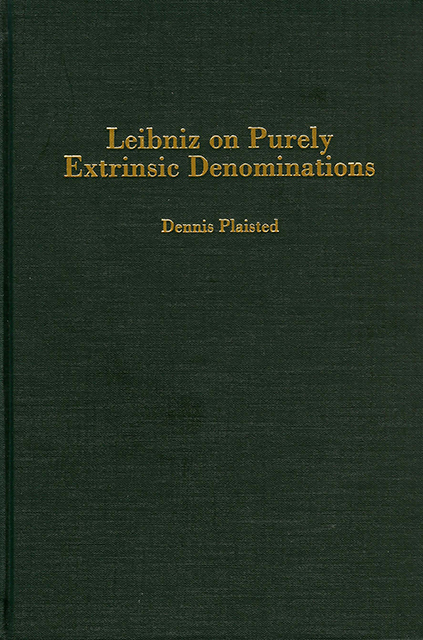Book contents
- Frontmatter
- Dedication
- Contents
- Acknowledgments
- Introduction
- Chapter One Two Views of Purely Extrinsic Denominations
- Chapter Two Truth and Purely Extrinsic Denominations
- Chapter Three Extrinsic Denominations and Where Accidents Are Allowed to Put Their Feet
- Chapter Four Extrinsic Denominations and the Interconnection of All Things
- Chapter Five Extrinsic Denominations and the Foundations of Relations
- Chapter Six Extrinsic Denominations and the Claim that Every Monad Expresses the Universe
- Appendix A Critique of Massimo Mugnai’s Version of NPE
- References
- Abbreviations
- Notes
- Index
Appendix - A Critique of Massimo Mugnai’s Version of NPE
Published online by Cambridge University Press: 25 March 2023
- Frontmatter
- Dedication
- Contents
- Acknowledgments
- Introduction
- Chapter One Two Views of Purely Extrinsic Denominations
- Chapter Two Truth and Purely Extrinsic Denominations
- Chapter Three Extrinsic Denominations and Where Accidents Are Allowed to Put Their Feet
- Chapter Four Extrinsic Denominations and the Interconnection of All Things
- Chapter Five Extrinsic Denominations and the Foundations of Relations
- Chapter Six Extrinsic Denominations and the Claim that Every Monad Expresses the Universe
- Appendix A Critique of Massimo Mugnai’s Version of NPE
- References
- Abbreviations
- Notes
- Index
Summary
Massimo Mugnai’s Leibniz’s Theory of Relations is the only other book besides this one that is entirely about Leibniz’s views on relations and extrinsic denominations. The interpretation Mugnai develops is, in some respects, similar to the reductionist one espoused by Mates, Cover and Hawthorne, and others. For example, he claims that, for Leibniz, the only accidents to be found in substances are intrinsic, non-relational ones. Unlike most reductionists, however, he asserts that Leibniz allowed relational properties to be included in complete individual concepts. Mugnai, in opposition to what has come to be called the Russell- Couturat Thesis, thus believes that, for Leibniz, what is true at the level of individual concepts is not always true at the level of substances and their accidents. Mugnai also does not appear to accept the reductionist reading of NPE:
On several occasions Leibniz unequivocally expresses the conviction that, if a relation existing between two or more subjects changes, this implies a change in all correlated subjects. Sometimes he expresses this by asserting that “from a strict metaphysical point of view … there is no purely extrinsic denomination.” … Since it seems to me that this assertion has given rise to misleading interpretations, it is essential to clarify its meaning. First of all, it must not be mistaken for the logical-ontological assertion that every extrinsic relation or denomination is founded on specific qualities in the correlated objects … .What Leibniz is maintaining is that there can be no mutation of a given relation without this having its effect on the intrinsic qualities of all the correlated objects.
So, for Mugnai, NPE is the claim that
(M1) A change of extrinsic denomination implies a change in the denominated thing (and any other thing(s) to which the denomination relates the denominated thing).
(M1), for all intents and purposes, is just (9) from chapter two. When Mugnai states in the above passage that NPE “must not be mistaken for the logical ontological assertion that every extrinsic relation or denomination is founded on specific qualities in the correlated objects,” I believe he means to distance himself from the standard reductionist reading of NPE. (M1) is clearly not the same understanding of NPE that reductionists endorse, nor is it the one I accept.
- Type
- Chapter
- Information
- Leibniz on Purely Extrinsic Denominations , pp. 99 - 106Publisher: Boydell & BrewerPrint publication year: 2002

